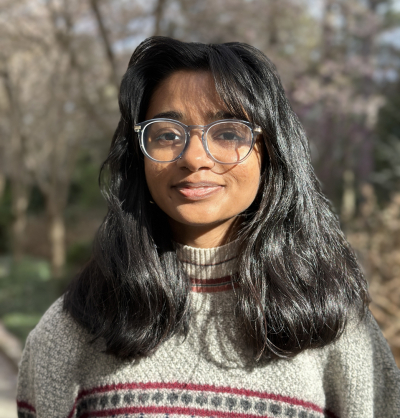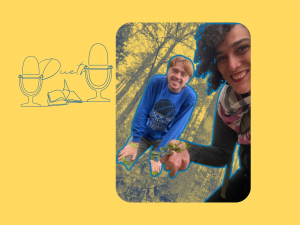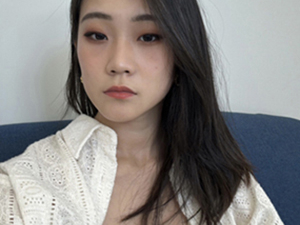“Walking” Madness: Preetha Ramachandran’s Research in Togo Experiments With an Alternative Methodology for Fieldwork

When Preetha Ramachandran went to Togo last summer with Professor Charlie Piot’s Duke Engage program, she wasn’t expecting to experiment with a new methodology for fieldwork. She was looking for a way to combine her two majors, Cultural Anthropology and Neuroscience, into a research project that drew on her interests in both disciplines. The result is her senior distinction project, “Entangled Madness: Walking, Talking and Caring for Folie in Farendé, Togo.”
“I wanted to think about the psychiatry apparatus as it operates globally,” she said, “and I wanted to critique it with the tools I've learned in my Cultural Anthropology classes. I thought it might be interesting to do a project that interrogates ‘madness,’ trying to bridge these two fields in an interesting way.”
Ramachandran’s “walking” methodology for conducting her research developed gradually, through trial and error, with the aid of Duke Engage’s site coordinator, Fidèle Ebia. “Initially, I’d planned to set up formal interviews with people and we'd sit down and have a conversation about madness,” she said. “Fidèle and I came up with the idea of doing surveys instead, but when we started to conduct the research, we found it was most effective to just walk around and talk to people informally, meeting them where they were.”
Ebia, a Ph.D. student at the University of Manchester, was born in Farendé and grew up in Lomé, the capital of Togo. She proved an invaluable partner for Ramachandran. “Fidèle has an intimate familiarity with the people who live in Farendé,” she said. “She acted as my linguistic and cultural translator throughout this project, helping us meet people I otherwise wouldn’t have been able to talk to so easily.
“Fidèle and I would start from the homestead where I lived and literally walk around the community, talking to anyone on the path. We talked to a group of people who collected at the barber, we talked to a tailor Fidèle knew very well, we talked to a woman at the market. We stopped in front of the mosque and spoke to the imam there. We went to the cybercafe, we spoke to a university student. In my distinction project, I theorize a bit about how to use social walking as a methodological mode.”
Ramachandran thinks social walking provided valuable context for the stories she collected. “I share an anecdote in my distinction project where I talked with a woman who told me that depression and anxiety don’t exist in the village. As she was talking, she was dropping dough into oil to create snacks that she was going to sell. The nuance was that there is no time or space for depression and anxiety in the village because this labor had to be done. Walking is what allowed me to understand what she meant. I had to see her within that context. In a formal interview it wouldn't have been the same.”
Just as she had to adjust her research methodology, Ramachandran realized she had to rethink the language she used to describe an array of mental disorders.
“I started my conversations with a language that included words like ‘mental health,’ ‘depression,’ ‘anxiety,’ ‘psychiatric disorder,’ things like that. I quickly realized this was insufficient to describe the things I was trying to talk about, so I pivoted to the language of madness: folie.
“Charlie and I, when we were describing a symptomology recognizable here as depression or anxiety, would ask people ‘what would the local name for this be?’ There was a disconnect, so I started asking for local terms for madness, or how madness would be recognized in the community. I learned there are two categories: nonviolent madness, which has a particular local term, and violent madness, which has another term associated with it. I brought these two new words to people in the community and asked for examples. Then I got all of these valuable vignettes and anecdotes. In my project I synthesize these, working between reality and fiction to draw up hypothetical stories that aren’t particular to any one case, but that pay homage to the source material.”
For Ramachandran, her research in Farendé left her with as many questions as answers. “Fieldwork is never complete,” she observed. “You’ll always have more questions, and that's a good thing because then you go back and ask them.”
She plans to continue working in global health, taking some time to do research before going to graduate school. “I'm still deciding between programs,” she said. “I hope that some experience and research will help me decide where the best place is for me and the next questions I want to ask.”





